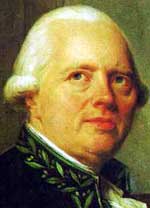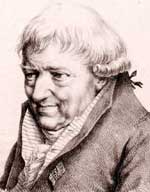

Walloon composer. As a child he studied music in chapels in Walcourt and Maubeuge, and at the cathedral of Nôtre Dame in Antwerp, where he was an organ and violin pupil of André-Joseph Blavier. In 1751 he went to Paris, where Rameau aided him in securing a position as violinist and bass player in the house orchestra of Le Riche de La Pouplinière, a wealthy music lover. He came into contact there with Johann Stamitz, and during this same period began publishing his own works, including his Trois grandes symphonies Op. 8 (1765) and Six simphonies à grand orchestre (1769).  He composed many works for the stage, including Le faux lord (1765), Les pêcheurs (1766), Sabinus (1733), Mirza (1779), Thésée (1782), Rosine (1786) and Les sabots et le cerisier (1803). In 1769, Gossec founded the "Concerts des amateurs"; in 1773 he resigned to become director of the Concert spirituel. Two years later he also became Maître de musique at the Opéra. From some time around 1790 he published a number of Revolutionary hymns and tunes. By 1799 he was principally a professor of composition at the Conservatory; in 1804 he was made Chevalier of the Légion d'Honneur, When Louis XVIII closed the conervatory in 1816, Gossec was remitted to living and ultimately death in penury. In addition to the works mentioned, he published some 50 symphonies, as well as symphonies concertantes, chamber works, more than 50 Revolutionary songs, and sacred vocal music, including Masses and oratorios.
He composed many works for the stage, including Le faux lord (1765), Les pêcheurs (1766), Sabinus (1733), Mirza (1779), Thésée (1782), Rosine (1786) and Les sabots et le cerisier (1803). In 1769, Gossec founded the "Concerts des amateurs"; in 1773 he resigned to become director of the Concert spirituel. Two years later he also became Maître de musique at the Opéra. From some time around 1790 he published a number of Revolutionary hymns and tunes. By 1799 he was principally a professor of composition at the Conservatory; in 1804 he was made Chevalier of the Légion d'Honneur, When Louis XVIII closed the conervatory in 1816, Gossec was remitted to living and ultimately death in penury. In addition to the works mentioned, he published some 50 symphonies, as well as symphonies concertantes, chamber works, more than 50 Revolutionary songs, and sacred vocal music, including Masses and oratorios.